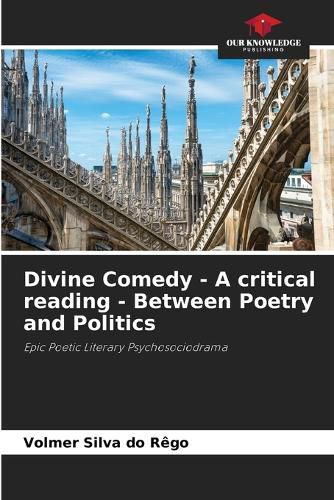Readings Newsletter
Become a Readings Member to make your shopping experience even easier.
Sign in or sign up for free!
You’re not far away from qualifying for FREE standard shipping within Australia
You’ve qualified for FREE standard shipping within Australia
The cart is loading…






After an extensive reading of various interrelated authors, whose specific interests were to read the Divine Comedy, a text about Politics from the Middle Ages disguised as poetry and a love song, with the aim of appreciating, analyzing and criticizing it in the light of modern socio-literary research, the author, journalist and professor Volmer S. do Rego, tried to point out and highlight the most dramatic aspect of the polysemic text. do Rego, sought to point out and highlight the most dramatic aspect of the polysemic text, which characterizes it as an immortal work of Western Latin poetry: a libel of the failed human attempt to exercise earthly power over populations, through extensive Roman colonization and domination, from the year I of the Christian Era, when Rome (the house of wolves) was rehearsing its first political-religious arrangements with the Jews, to the fierce struggle of the incipient and still embryonic European national states, interested in knowledge, and in the enormous power that the popes held, at the time when the fall of the empire in the East and the European cultural Renaissance were already looming. The axis of this bloody dispute, however, remains to this day between the Germanic Northern Hemisphere and the Latin Southern Hemisphere, under various aliases: Geopolitics and Globalization are the most common.
$9.00 standard shipping within Australia
FREE standard shipping within Australia for orders over $100.00
Express & International shipping calculated at checkout
After an extensive reading of various interrelated authors, whose specific interests were to read the Divine Comedy, a text about Politics from the Middle Ages disguised as poetry and a love song, with the aim of appreciating, analyzing and criticizing it in the light of modern socio-literary research, the author, journalist and professor Volmer S. do Rego, tried to point out and highlight the most dramatic aspect of the polysemic text. do Rego, sought to point out and highlight the most dramatic aspect of the polysemic text, which characterizes it as an immortal work of Western Latin poetry: a libel of the failed human attempt to exercise earthly power over populations, through extensive Roman colonization and domination, from the year I of the Christian Era, when Rome (the house of wolves) was rehearsing its first political-religious arrangements with the Jews, to the fierce struggle of the incipient and still embryonic European national states, interested in knowledge, and in the enormous power that the popes held, at the time when the fall of the empire in the East and the European cultural Renaissance were already looming. The axis of this bloody dispute, however, remains to this day between the Germanic Northern Hemisphere and the Latin Southern Hemisphere, under various aliases: Geopolitics and Globalization are the most common.